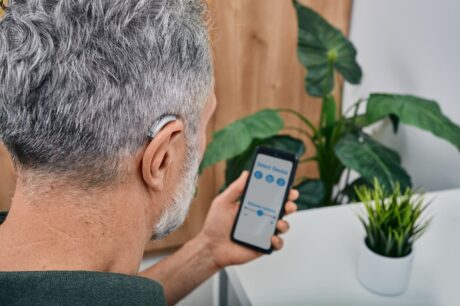Hearing loss is a prevalent condition, with more than 1.5 billion (or 1 in 5) people suffering with it. Fortunately, advancements in technology have led to various treatment options that can significantly improve hearing and quality of life. Among these solutions, cochlear implants and hearing aids stand out as two prominent choices. However, understanding the distinctions between these devices is crucial for making informed decisions about your hearing health.
Hearing Aids: Amplifying Sound for Mild to Moderate Hearing Loss
Hearing aids are small electronic devices worn in or behind the ear that amplify sounds to make them louder and easier to hear. They work by capturing sound waves with a microphone, converting them into electrical signals, and amplifying those signals before sending them to a speaker or receiver that delivers the sound to the ear.
Hearing aids come in various types, including:
- Behind-the-Ear (BTE): These are worn behind the ear and connected to a custom earmold that fits inside the ear canal.
- In-the-Ear (ITE): These fit completely within the outer ear bowl.
- In-the-Canal (ITC): These are smaller and fit partly or completely inside the ear canal.
Hearing aids are most effective for individuals with mild to moderate hearing loss, where the inner ear’s hair cells are still partially functional. By amplifying sounds, hearing aids can significantly improve communication, social interaction and the overall quality of life for those with this level of hearing loss, especially if they’re well taken care of.
Cochlear Implants: Bypassing Damaged Hair Cells for Severe to Profound Hearing Loss
Cochlear implants are surgically implanted electronic devices that bypass damaged hair cells in the inner ear, and directly stimulate the auditory nerve. Unlike hearing aids, which amplify sound, cochlear implants provide a sense of sound by converting sound waves into electrical signals that are then transmitted to the brain.
A cochlear implant consists of two main parts:
- External Speech Processor: Worn behind the ear, it captures sound and converts it into digital signals.
- Internal Receiver/Electrode Array: Surgically implanted beneath the skin, it receives signals from the speech processor and sends electrical impulses to the auditory nerve.
Cochlear implants are designed for individuals with severe to profound hearing loss, where traditional hearing aids provide little or no benefit. They can restore hearing sensation and enable individuals to understand speech and environmental sounds, leading to improved communication and social participation.
Choosing the Right Option for Different Hearing Needs
Deciding between a cochlear implants and a hearing aid depends on several key factors:
- Degree Of Hearing Loss:Hearing aids are generally suitable for mild to moderate hearing loss, while cochlear implants are designed for severe to profound hearing loss.
- Communication Needs and Goals: Consider your specific communication needs and goals. Do you primarily struggle in quiet environments or noisy settings? What level of speech understanding do you aim to achieve?
- Overall Health and Suitability For Surgery:Cochlear implants require surgery, so your overall health and suitability for the procedure will be evaluated.
- Willingness to Commit to Rehabilitation and Training:Cochlear implants require a period of rehabilitation and training, to adapt to the new way of hearing and maximise their benefits.
Your Path to Better Hearing

Cochlear implants and hearing aids address different levels of hearing loss. Hearing aids amplify sound for mild to moderate cases, while cochlear implants bypass damaged hair cells to provide hearing sensations for those with severe to profound hearing loss. The best choice depends on your individual needs and circumstances.
To determine the most suitable solution for your unique circumstances, it’s essential to consult with an experienced audiologist. At an audiology and hearing aid centre, the audiologist will conduct a thorough examination, evaluating your hearing and discussing your lifestyle and communication needs. They will then guide you through the options, explaining the pros and cons of each device and helping you make an informed decision.
To take the first step towards better hearing, schedule a consultation or an ear check up in Singapore with the audiologists at the Listening Lab today. We’re dedicated to providing personalised care and comprehensive hearing solutions, such as hearing aid fittings and cochlear implants in Singapore, to help improve your quality of life.


















